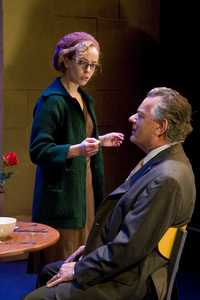

"How did you die so quietly?" That's the question that Jean (Ashley Campos) has for the dead man, Gordon (Michael Poisson) in Barter Theatre's production of "Dead Man's Cell Phone."
"How did you die so quietly?" That's the question that Jean has for the dead man, Gordon, and for the audience as well. It is Gordon's untimely death that acts as the play's inciting incident and motivates Jean's search for some meaning to Gordon's life -- and to her own life.
This is a comedy, so the play doesn't get weighed down by deep existential angst, but it makes audience members laugh at the absurdity of it all.
When Jean asks her question about Gordon, you come to understand very early on why she asks. A human being's existence has been snuffed out, and in Jean's mind, there should be more pomp, more circumstance. At the very least, someone should care. So Jean does the only thing one can do when one finds a dead man sitting across from her at a café: she steals his cell phone. Actually, she picks it up to call 9-1-1, but in doing so she takes the first step into unraveling Gordon's life, and that's the reason why this piece from playwright Sarah Ruhl works so well.
Gordon is already dead when the play begins, and you know nothing about him, not even his name. Yet Jean begins calling numbers, unveiling his existence to the audience. She attends his funeral (where Gordon's cell phone rings during the eulogy), and she meets Gordon's mother, Mrs. Gottlieb. This leads to dinner at the mother's home where she meets Hermia, Gordon's widow, and Dwight, Gordon's brother. It's a dinner you won't forget because Jean manages to frustrate Mrs. Gottlieb, befuddle Hermia, and spark a romance with Dwight.
The beauty of the comedic moments is that they are not slapstick. Jean's natural quirks, and her propensity to lie to make others feel good, make for moments of laughing out loud. And it's interesting that while we learn about Gordon (a sleaze ball), we also learn about Jean and the reasons why she claws her way into this family.
There is a deeper side to this production, which balances well with the comedy. Jean is an isolated, lonely person, and the very idea of family intrigues her. Even when she finds a dead man across from her, she touches him tenderly rather than recoiling. And the issue of a cell phone being her entrance into this man's family is also poignant. The cell phone represents isolation and distance, and Jean uses it to bridge the gaps in this dysfunctional family. She even uses it to form her own connections. The cell phone is also the most powerful symbol at the end of this play.
All the actors, with umbrellas in hand, enter Jean's waking dream. It is a great visual moment.
Ashley Campos is well cast as Jean, because she can express in many ways what the character is thinking without having to say a word. She also can portray an utter sense of loneliness that makes her character's eagerness to bond very believable.
Nicolas Piper's performance as Dwight, though subtle, is his best work since "The Road Where it Curves Away." In the end, he seems to be the character, rather than portraying him.
This play works well in repertory with "Alice in Wonderland" and "The Diary of Anne Frank." It's fun, but not light. It has a strong dramatic thread, as well as humor. It's a great middle-of-the-road escape.
About the Writer: Thomas Bryant teaches at Virginia Highlands Community College in Abingdon. He has a BA in English from King College and a master's degree in Screenwriting & Film Studies from Hollins University. His play "Thesis" had a staged reading at the Burning Coal Theatre in Raleigh, N.C., and his "Level to the Ground"was selected for the Henri Edmonds' New Works Festival.